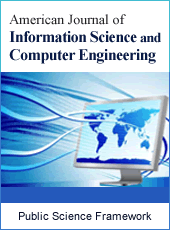American Journal of Information Science and Computer Engineering
Articles Information
American Journal of Information Science and Computer Engineering, Vol.4, No.1, Mar. 2018, Pub. Date: Aug. 31, 2018
Energy-Aware Data Aggregation in Wireless Sensor Networks Using Particle Swarm Optimization Algorithm
Pages: 1-6 Views: 2021 Downloads: 561
[01]
Esmaeil Rezaei, Department of Computer, Islamic Azad University, Sepidan Branch, Sepidan, Iran.
[02]
Safieh Ghasemi, Department of Computer, Islamic Azad University, Sepidan Branch, Sepidan, Iran.
Today many researchers are paying attention to wireless sensor networks due to their vast use in different sciences all over the world. The recollection of energy resources is almost impossible because each node usually acts in natural environments. The awareness of this problem and the fact that each node loses parts of its energy in routing and transmission of data packets makes the use of data aggregation technique so important. Data aggregation algorithms mainly aim to increase the networks lifetime due to reduction of packets transmitted to other nodes. These algorithms are compared with respect to lifetime, Latency and data accuracy. This study presents an effective approach to reducing energy consumption in wireless sensor networks through clustering to increase general lifetime of the network. Our proposed approach uses particle swarm optimization algorithm. The fitness function is computed with respect to initial energy, centralization, average distance and the remaining energy of nodes. The evaluation of the proposed approach shows better performance comparing to other methods.
Wireless Sensor Networks, Data Aggregation, Network Lifetime, Particle Swarm Optimization
[01]
Akyildiz, I. F., Su, W., Sankarasubramaniam, Y., & Cayirci, E. (2002). A survey on sensor networks. IEEE communications magazine, 40 (8), 102-114.
[02]
Bharathi, M. A., Vijayakumar, B. P., & Manjaiah, D. H. (2013). Cluster based data aggregation WSN using swarm optimization technique. International Journal of Engineering and Innovative Technology (IJEIT), 2 (12).
[03]
Carvalho, M., & Ludermir, T. B. (2006, October). An analysis of PSO hybrid algorithms for feed-forward neural networks training. In 2006 Ninth Brazilian Symposium on Neural Networks (SBRN'06) pp. 6-11). IEEE.
[04]
Ducrocq, T., Mitton, N., & Hauspie, M. (2013, April). Energy-based clustering for wireless sensor network lifetime optimization. In Wireless Communications and Networking Conference (WCNC), 2013 IEEE (pp. 968-973). IEEE.
[05]
Esnaashari, M., & Meybodi, M. R. (2010). Data aggregation in sensor networks using learning automata. Wireless Networks, 16 (3), 687-699.
[06]
Gupta, M., Jin, L., & Homma, N. (2004). Static and dynamic neural networks: from fundamentals t advanced theory. John Wiley & Sons.
[07]
Ilyas, M., & Mahgoub, I. (Eds.). (2004). Handbook of sensor networks: compact wireless and wired sensing systems. CRC press.
[08]
Kulkarni, R. V., & Venayagamoorthy, G. K. (2011). Particle swarm optimization in wireless-senso networks: A brief survey. Systems, Man, and Cybernetics, Part C: Applications and Reviews, IEEE Transactions on, 41 (2), 262-267.
[09]
Lindsey, S., Raghavendra, C., & Sivalingam, K. M. (2002). Data gathering algorithms in sensor networks using energy metrics. IEEE Transactions on parallel and distributed systems, 13 (9), 924-935.
[10]
Meybodi, M. R., Beigy, H., & Taherkhani, M. (2003). Cellular learning automata and its applications. Sharif Journal of Science and Technology, 19 (25), 54-77.
[11]
Narendra, K. S., Thathachar, M. A. (1974). Learning automata-a survey. IEEE Transactions on systems, man, and cybernetics, (4), 323-334.
[12]
Rajagopalan, R., & Varshney, P. K. (2006). Data aggregation techniques in sensor networks: A survey.
[13]
Rostami, A., & Mottar, M. H. (2014). Wireless Sensor Network clustering using particles swar optimization for reducing energy consumption. International Journal of Managin Information Technology, 6 (4), 1.
[14]
Yang, X. S., & Geem, Z. W. (2009). Music-inspired harmony search algorithm: theory and applications.

ISSN Print: 2381-7488
ISSN Online: 2381-7496
Current Issue:
Vol. 7, Issue 3, September Submit a Manuscript Join Editorial Board Join Reviewer Team
ISSN Online: 2381-7496
Current Issue:
Vol. 7, Issue 3, September Submit a Manuscript Join Editorial Board Join Reviewer Team
| About This Journal |
| All Issues |
| Open Access |
| Indexing |
| Payment Information |
| Author Guidelines |
| Review Process |
| Publication Ethics |
| Editorial Board |
| Peer Reviewers |


